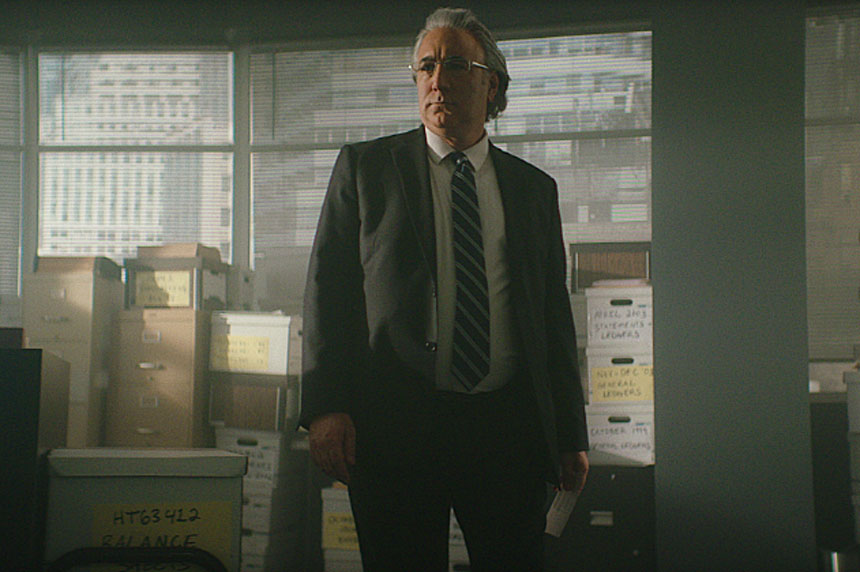Madoff: The Monster of Wall Street
⭐️ ⭐️ ⭐️⭐️
Four 1-hour episodes
Director: Joe Berlinger
Streaming on Netflix
You’d think a four-hour documentary about world-class Ponzi scheme operator Bernie Madoff would be an exercise in overkill. Infuriating as it is, can’t the whole sordid affair be summed up as follows: Bad man cheats gullible investors out of $64.8 billion?
But director Joe Berlinger (whose Ted Bundy documentary, Extremely Wicked, Shockingly Evil and Vile is the stuff of nightmares) sees a much bigger picture. He aims his telescope at the oft-told Madoff story and finds not a singular black hole of evil sucking in greedy get-rich-quick investors — but a galaxy of co-conspirators bilking thoughtful individuals and institutions whose due diligence was foiled by negligent federal regulators.
The Ponzi is the simplest of schemes: You entice people to give you money, assuring them you will invest it on their behalf. Instead, you keep that cash, skim some off the top for yourself, and pay your initial investors what appears to be an exorbitant profit — when in reality you’re just handing them money that has been entrusted to you by more investors. As long as you keep finding new suckers to hand over their dough — and it’s not hard when you’re paying such high premiums to the earlier investors — you can keep the scheme going indefinitely.
Yes, I’ve just described how Social Security works. Of course, the government has the option of printing up more money. The Ponzi schemer does not.
For his deep-dive into Madoff Land, Berlinger interviews an impressive spectrum of subjects, ranging from an FBI and Securities and Exchange Commission agents to Madoff’s personal assistant to victims whose trust in Madoff caused them to lose everything. We see nearly all of them briefly, but most of the time the director enlists a cast of actors who recreate key moments in the infuriating saga.
At times the strategy works handsomely. Most dramatically, Berlinger’s camera descends, in a single shot, from Madoff’s gleaming white-and-gray legitimate brokerage firm on the 19th floor of Manhattan’s Lipstick Building to, two floors below, Ponzi Central, the paper-strewn, banker’s box-clogged madhouse populated by shady characters Madoff enlisted from, in some cases, the street.
Then again, the dramatization ploy can cause confusion. I found myself wondering things like, “Is that a real home movie of the Madoffs partying in the Hamptons, or is it a re-creation? Are those Bernie’s actual parents in that snapshot, or a couple of extras from the Actors Guild?”
If Madoff seems a bit overwrought at times, Berlinger, an Oscar- and Emmy-nominated filmmaker, is a skilled enough cinematic navigator to float us around Madoff’s rockier narrative moments. And in a tale of such unprecedented financial barbarism, perhaps a bit of operatic overload is appropriate (although when the actor playing Bernie, Joseph Scotto, gazes into the camera and curls his lip in a demonic smile, you kind of want to say, “Oh, come on!”).
The true revelation here, for those of us who only casually followed the Madoff story, is the number of times he nearly got caught early on. In fact, according to Berlinger, federal regulators catch Madoff dead to rights running an illegal investment scheme repeatedly, all the way back to the 1990s. But largely due to Madoff’s stature in the investment community, they not only let him off the hook, but also issue multiple statements declaring that there seems to be no fraud of any kind involved.
After one 1990s wrist slap, the government tells Madoff to return his investors’ money. He does — and finances the reimbursement through yet another Ponzi scheme. But the damage is done. Many of Madoff’s investors, afraid of losing those double-digit returns, send the money right back. Feeling invincible, Madoff defiantly continues his unregistered investment operation — waving the Feds’ “no fraud” declaration as proof he’s on the up-and-up. The supposed clean bill of health entices not only more small investors, but entire hedge funds as well.
Simple as a Ponzi scheme is, Madoff’s industrialization of the concept can get mighty complicated. Berlinger is a patient storyteller, holding our hands through the complicated stuff while leaving us free to share his visceral outrage over the more outrageous episodes.
For all the director’s fireworks, though, the film’s most impactful moments come in harshly lit interrogation rooms as Madoff himself, surrounded by diet cola cans, spills his story in video court depositions. Gone are the snappy suits, the salon haircuts, the smug smile that for decades graced the pages of the world’s financial pages. Here is an old, beaten man, attempting to explain himself.
Lamely, he tentatively tries to pin the blame on his “greedy” clients, implying he was facing crushing pressure to make them happy. At other times he describes felonious behavior in a tone so casual you’d think he was explaining how to make a peanut butter sandwich.
In the end, Madoff seems to be less certain about his true motivations than we are. He may not have even been in it for the money — for much of the Ponzi scheme’s course, Madoff’s legitimate business, run by his two unsuspecting sons, was thriving.
Many of us watched the Madoff scandal unfold with smug satisfaction — tut-tutting those who poured their savings into something that was clearly too good to be true. Still, it’s sobering to witness how easy it can be for smart people — educated folks, savvy businesspeople, and hardened government investigators alike — to be hoodwinked by a smiling set of capped teeth, a shock of gray hair, and an endless supply of congenial arrogance.
Become a Saturday Evening Post member and enjoy unlimited access. Subscribe now




Comments
I’m in my 70’s Don’t need thrashing gun violence. Great choices you’ve made. Thanks
I’m impressed with this latest look (and take) on the Madoff saga, from your in-depth review here. If it’s a bit overwrought at times, than it probably needs to be, considering who we’re dealing with here and the outrageous level of crime.
Perhaps this third time will be the charm. I really liked the ABC version from 2016 with Richard Dreyfuss and Blythe Danner very much, and the 2017 version with Robert De Niro and Michelle Pfieffer. There were different angles and nuances of one from the other, even though both had the same core elements.
In both cases I felt a great deal of sympathy for the wife and sons who really were kept in the dark. A lot of people judged them as being accessories simply because of who they were. “How could they not know?” Well, for the same reasons his investors and everyone else didn’t know. He wasn’t ‘The Wizard of Lies’ for nothing.
The federal regulators could and should have shut him down in the ’90s (per paragraphs 9-10 above) but didn’t, making them as guilty as Madoff. He no doubt knew whom to pay off as a small price in his orbit of “just doing business”. It’ll be interesting to see how that’s portrayed in this new version.